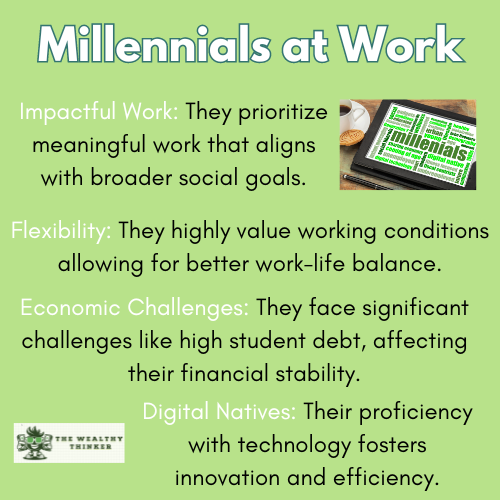As you step into any modern workspace, the influence of Millennials is unmistakable.
Born between 1981 and 1996, this generation is now the largest in the labor force, reshaping how work gets done across all sectors. Millennials are distinct in their outlook on what they expect from their employers and what they believe their contributions should be.
This exploration into the impact this generation has had on the workplace highlights not just their preferences but also the profound shifts they are driving in corporate culture.

Understanding Millennials in the Workplace
Millennials, often termed the ‘purpose generation,’ look for meaningful work where they can make an impact.
This desire for purpose-driven careers has compelled companies to rethink their missions and corporate social responsibility strategies. According to a study by Cone Communications, nearly 64% of Millennials consider it crucial that a company gives back to society instead of just making a profit.
Millennials’ affinity for technology and their progressive values are pushing workplaces towards greater inclusivity and innovation. They champion diversity, equity, and inclusion, making these elements non-negotiable in their work environments.
Mastering the Down Payment Challenge: Tips and Tricks for Millennials Saving for a Home→
Workplace Preferences
Flexibility and work-life integration are at the forefront of Millennial workplace preferences.
Unlike previous generations who prioritize job security, Millennials lean towards jobs that offer flexibility in schedules and work arrangements. Deloitte’s Millennial Survey highlights that 84% of Millennials seek greater flexibility to improve work-life balance without impacting productivity.
They also prefer a flat corporate structure over a hierarchical one, favoring workplaces where collaboration and open communication are encouraged.
This preference influences not just their choice of employers, but also how they interact within the business setting, fostering a more team-oriented work environment.
Adoption of Technology
Millennials are digital natives.
Having grown up during the internet boom, they are adept at leveraging technology to increase efficiency and connectivity in the workplace. Their technological fluency allows them to navigate various platforms and digital tools with ease, and they often lead digital transformation initiatives within their organizations.
This tech-savviness also positions them well for leadership in emerging industries where innovation and a deep understanding of digital platforms are critical, such as in tech startups, digital marketing, and e-commerce.
Generations in the Workforce: How Are Gen Z’s Shaping the Job Market?→
Challenges Faced by Millennials
Despite their significant contributions, they face unique challenges. The burden of student debt looms large for many within this generation, influencing their financial decisions and career paths. The average student loan debt for Millennials stands at $25,000-$30,000, affecting their economic stability and savings potential.
Additionally, Millennials often combat stereotypes in the workplace, such as being seen as entitled or non-committal, which can hinder their professional growth.
Overcoming these perceptions requires them to consistently demonstrate dedication and competence, balancing their desire for flexibility with a strong work ethic.
Generations in the Workforce: How Do Boomers Shape the Landscape?→
Key Takeaways
- Impactful Work: They prioritize meaningful and impactful work, influencing companies to align their operations with broader social goals.
- Flexibility: They value flexible working conditions that support a balanced lifestyle, leading to the widespread adoption of remote work and flexible hours in various sectors.
- Technology Integration: Their proficiency with technology drives innovation and efficiency in the workplace.
- Economic Challenges: Student debt and economic uncertainties significantly shape their financial and professional decisions.
- Navigating Stereotypes: This generation must continually navigate workplace stereotypes to prove their value and reshape perceptions.
Millennials at Work: Final Thoughts
Millennials are not just transforming the workplace; they are redefining what a successful career looks like.
Their emphasis on flexibility, purpose, and technology integration is making the modern workplace more dynamic and adapted to the needs of today’s society.
As they move into more significant leadership roles, their impact is expected to grow, steering future generations towards an even more inclusive, flexible, and socially responsible work environment.
By understanding and addressing the unique needs and challenges this generation faces, employers can unlock a powerful drive for innovation and growth within their organizations.



















